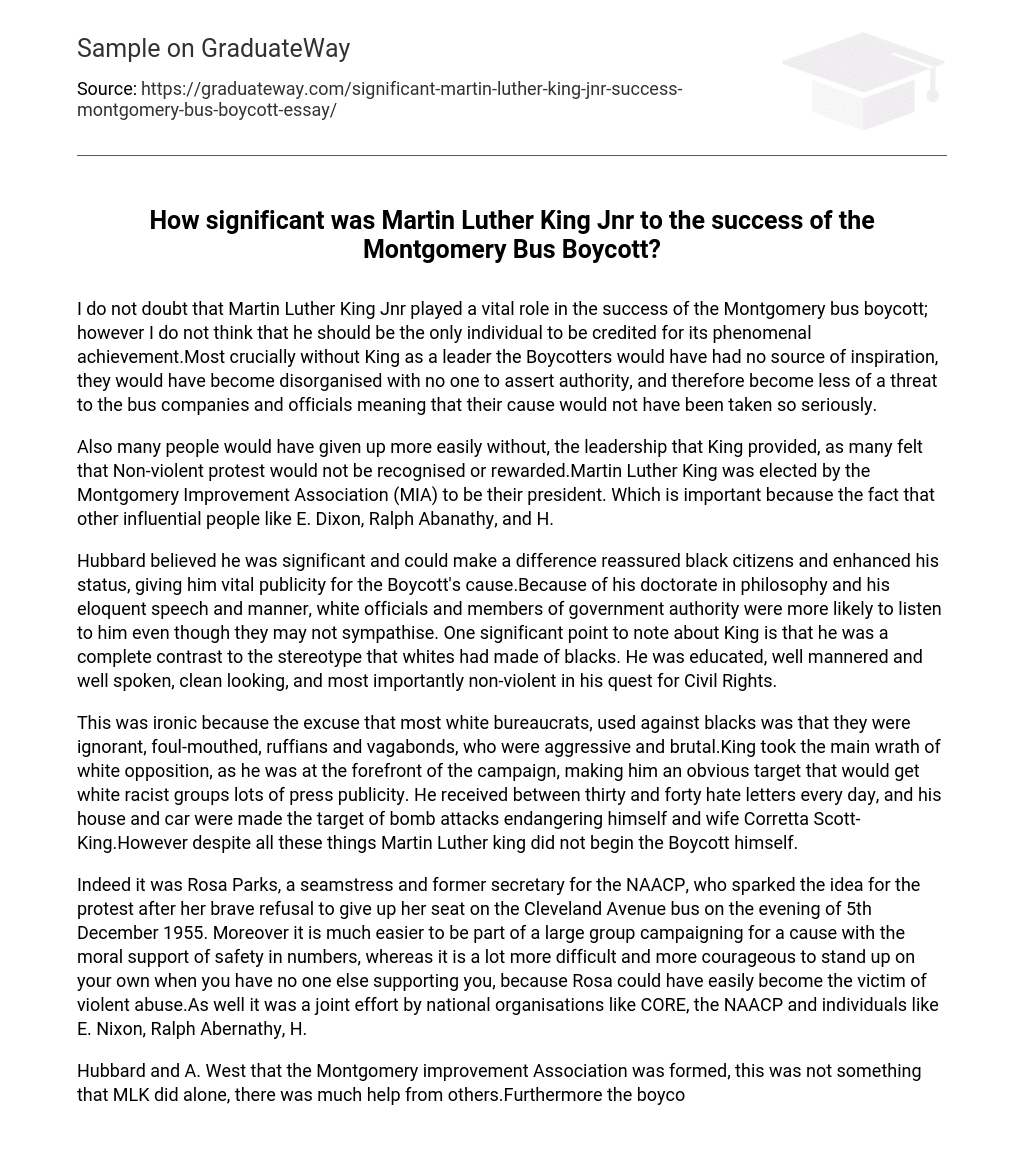I have no doubt that Martin Luther King Jnr played a crucial role in the success of the Montgomery bus boycott. However, I believe it would be unfair to solely credit him for its extraordinary achievement. Without King’s leadership, the Boycotters would have lacked inspiration and become disorganized without anyone to provide direction. Consequently, they would have posed less of a threat to the bus companies and officials, resulting in their cause not being taken as seriously.
The leadership provided by Martin Luther King was crucial as it encouraged people to not give up easily. Many believed that non-violent protests would not be acknowledged or appreciated. Martin Luther King was chosen as the president of the Montgomery Improvement Association (MIA), a significant position. This is important because other influential individuals like E. Dixon, Ralph Abanathy, and H. recognized his leadership.
Hubbard, with his confidence and belief in his own significance, was able to gain the trust and support of black citizens. His efforts were crucial in raising awareness for the Boycott’s cause. Additionally, his impressive educational background and eloquence made white officials and government members more inclined to pay attention to him, even if they didn’t sympathize with the cause. It is important to highlight that King shattered the stereotype that whites had constructed about blacks. He possessed education, manners, articulation, a neat appearance, and most importantly, he advocated for Civil Rights through non-violent means.
Despite the irony that most white bureaucrats justified their discrimination against blacks by labeling them as ignorant, foul-mouthed ruffians and vagabonds who were aggressive and brutal, Martin Luther King Jr. bore the brunt of white opposition. Being at the forefront of the campaign, he became an obvious target for white racist groups seeking publicity. King received an average of thirty to forty hate letters daily, and his house and car were frequently targeted in bomb attacks that endangered both himself and his wife, Corretta Scott-King. However, it is important to note that King did not initiate the Boycott himself.
Rosa Parks, a seamstress and former secretary for the NAACP, inspired the protest by refusing to give up her seat on the Cleveland Avenue bus on December 5th, 1955. Being part of a large group campaigning for a cause provides moral support and safety in numbers. However, it takes much more courage to stand up on your own without anyone supporting you. Rosa could have easily become the victim of violent abuse. The protest was also supported by national organizations like CORE and the NAACP, as well as individuals like E. Nixon, Ralph Abernathy, and H.
According to Hubbard and A. West, the Montgomery improvement Association was not solely led by MLK, as others provided significant assistance. The success of the boycott depended heavily on the participation and relentless campaigning of numerous black citizens, who boldly faced challenges and violence.
One elderly woman in Montgomery expressed her fatigue, but also her inner peace, by stating “My feet are tired, but my soul is rested”.1 The swift progression of the case to court was partially influenced by the significant financial losses experienced by the city’s bus companies, totaling up to 75% of their revenue. Furthermore, ministers like King found it easier to contribute to the cause due to their privileged backgrounds. Unlike most citizens, King had the option to travel by car or afford higher taxi fares. These prices had been increased from a mere 10 cents, equivalent to a bus ride, to 45 cents per passenger. Montgomery officials enacted a mandatory law in response to the successful boycott, reflecting their growing concern and anxiety.
Not only King, but also others faced violence or abuse from opposition. Reverend Robert Graetz, a white minister who served a predominantly black community in his church, had his house bombed, while other members of MIA received threatening letters. On the streets, the boycott angered some white extremists, resulting in the throwing of eggs or other food substances at black individuals. However, there were whites who supported the cause and non-violent protest demonstrations.
Martin Luther King Jnr’s contribution to the Montgomery Bus boycott was significant. However, it is essential to acknowledge that the boycott’s remarkable success was only possible with the assistance of other individuals, organizations, and the dedication of three thousand or more black and white citizens who sustained the boycott for 381 days (1 Pg. 40 Causes and consequences of the African American Civil Rights Movement).





